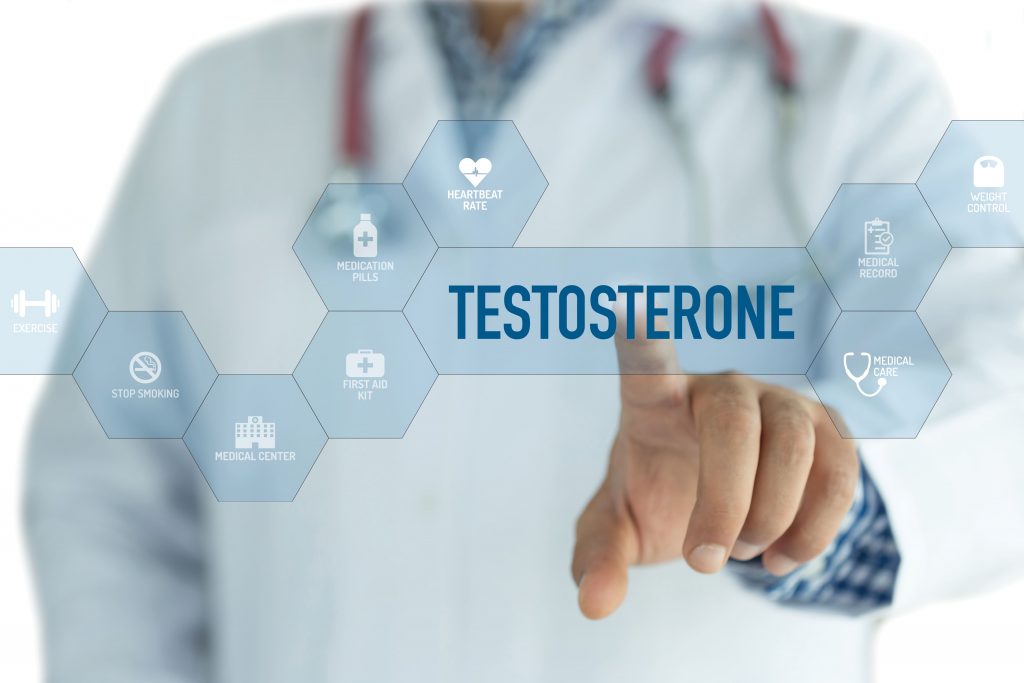How a Testosterone Test Could Save Your Relationship

Aging doesn’t mean you cannot enjoy an active sex life. Testosterone, the primary hormone powering men’s sexual desire, can remain stable even into later years. A study by Clinical Endocrinology showed that in healthy older men (60-70 yo), their testosterone levels were similar to men 30 to 40 years younger than them!1 How come?
Lifestyle. The New England Journal of Medicine estimates obesity reduces your testosterone levels by 30%.2 According to the study, men with balanced testosterone levels were leaner, had no chronic disease, and were healthier overall.
A simple testosterone test – complemented with AI technology – can keep your health at its peak and your sexual life vibrant as you age.
Aging Doesn’t Mean Poor Health
Aging is inevitable. However, many of the diseases associated with it are not.
The World Health Organization is clear. Some of the differences in health as you age are genetic, but most health impacts stem from your lifestyle and environment.3
For your sex life, the way you live has massive consequences. Obesity, excessive alcohol, or chronic illness adds a 10–15% decline in testosterone levels, which equates to an extra decade of aging, as the Journal of Clinical Endocrinology and Metabolism warns.4,5
The good news is that you can influence how you age to keep your testosterone at optimal levels.
Reversing Testosterone Decline Is Possible

A study by Diabetes, Obesity, and Metabolism found that a low-calorie diet increased testosterone in 81% of those that started the study at already low levels (of the 48% with low testosterone at the start, only 9% had low testosterone after the program.6)
If health is important to you or your sex drive is not what it used to be, you may consider an at-home testosterone test with Kyla, a leading anti-aging app.
Why You Need a Testosterone Level Test
1) Testosterone and Your Future Health
According to the Journal of Sexual Medicine, men who correct their testosterone deficiencies also experience weight loss and improve their cholesterol levels, blood pressure, and HbA1c (blood sugar) levels.7
In a study by Diabetes Care, men with the lowest testosterone levels had more than double the risk of developing metabolic syndrome and diabetes compared to their higher-testosterone counterparts, results that propelled the researcher to propose abnormal testosterone levels as an early indicator of future metabolic disturbances.8
2) Men Shouldn’t Expect to Lose Sexual Vigor

A common misconception is that men experience a masculinized version of menopause (andropause). While testosterone decreases due to aging and mainly through comorbidities, it cannot be equated with the abrupt and virtually complete cessation of hormonal secretion in menopause. Springer’s Testosterone states that andropause is synonymous with aging and its comorbidities, not a novel medical condition.9
Human Reproductive Update Journal confirms that you should not conform to an unfulfilling sex life as you age. Sexually active men can maintain reproductive function even in their 60s. So, if your sexual vigor is dwindling, check your testosterone levels and other markers (like blood sugar and cholesterol) to find out what’s happening.10
3) Insufficient Sexual Desire Has Many Causes
Multiple conditions, such as circulatory diseases and depression, can cause low libido. A study published by The New England Journal of Medicine found that in a sample of older men, 27.5% to 39.9% presented sexual problems; nevertheless, only 2.1% had low testosterone.2
How come? The primary impact of testosterone is on sexual interest and motivation (libido). In otherwise healthy men with low testosterone, when this deficiency is corrected, as the Journal of Clinical Endocrinology and Metabolism shows, their sexual function improves in every aspect.11
However, in men with erectile dysfunction (ED), testosterone deficiency is a rare cause, as The Journal of Urology reveals. The common basis for ED is a neurovascular disorder – a feature of underlying cardiovascular disease – emphasizing the need for comprehensive testing if you’re experiencing sexual performance difficulties.12
When To Consider a Testosterone Test
These are signs that your testosterone levels might be low:9,13

- Diminished sexual desire.
- Feeling unusually hot.
- Difficulty in achieving or maintaining an erection.
- Tiredness.
- Abnormal hair growth or menstrual irregularities in women.
The following conditions affect your testosterone levels:9,13
- Diabetes.
- Heart problems.
- Depression.
- Obstructive sleep apnea.
- Obesity.
- Liver or renal disease.
A testosterone test measures the amount of total testosterone in your blood. Testosterone testing is straightforward and quick with Kyla. Our Primary Care Panel can be completed right in your home through a quick finger prick and within 24 hours, you know everything about your testosterone levels along with many other aspects of your health.
Low testosterone signs in young, healthy men are more evident, as the Journal of Clinical Endocrinology and Metabolism clarifies; however, in older men with comorbidities or obesity, it is more challenging to diagnose. Just one Kyla Primary Care Panel covers multiple tests and provides a better picture of what could be affecting your sex life.14
Optimizing Your Testosterone Levels to Live Longer
At Kyla, we believe in catching problems on time. Results can be dramatic when you correct your testosterone levels – or other issues – early.
Studies by the Journal of Clinical Endocrinology and Metabolism found that men with the lowest testosterone levels faced a 40% higher risk of death, primarily due to cardiovascular and respiratory diseases. In a study with veterans, those who corrected testosterone deficiencies had a mortality rate of 10.3%, significantly lower than the 20.7% observed in those who didn’t.15,16
Kyla: Protecting Your Sex Life as You Age
With Kyla, your sex life doesn’t have to vanish as you age. Kyla card combines a testosterone test with other diagnostic tools that, together, remove all guessing out of your hormonal health and detect the root causes behind your sexual concerns.
Studies published in Metabolites and The World Journal of Men’s Health found that a testosterone test, when combined with other diagnostic tools– available in our Male Panel – is capable of identifying men who will experience complications from COVID-19 or even detecting their risk of developing heart problems in the future.17,18
AI-driven risk engines – like Kyla – are redefining what preventive medicine is. Our app suggests practical interventions you can start immediately that will put you on track to recover your youthful energy.
Don’t accept an unfulfilling sex life as a normal part of aging.
Download the Kyla app and safeguard the passion of your relationship.
References
- Frost M, Wraae K, Nielsen TL, Hougaard DM, Brixen K, Hagen C, Andersen M. Similar reference intervals for total testosterone in healthy young and elderly men: results from the Odense Androgen Study. Clinical endocrinology. 2013 May;78(5):743-51.
- Wu FC, Tajar A, Beynon JM, Pye SR, Silman AJ, Finn JD, O’Neill TW, Bartfai G, Casanueva FF, Forti G, Giwercman A. Identification of late-onset hypogonadism in middle-aged and elderly men. New England Journal of Medicine. 2010 Jul 8;363(2):123-35.
- World Health Organization. Ageing and health [Internet]. World Health Organization; [cited 2024 Feb 2]. Available from: https://www.who.int/news-room/fact-sheets/detail/ageing-and-health
- Feldman HA, Longcope C, Derby CA, Johannes CB, Araujo AB, Coviello AD, Bremner WJ, McKinlay JB. Age trends in the level of serum testosterone and other hormones in middle-aged men: longitudinal results from the Massachusetts male aging study. The Journal of Clinical Endocrinology & Metabolism. 2002 Feb 1;87(2):589-98.
- Travison TG, Araujo AB, Kupelian V, O’Donnell AB, McKinlay JB. The relative contributions of aging, health, and lifestyle factors to serum testosterone decline in men. The Journal of Clinical Endocrinology & Metabolism. 2007 Feb 1;92(2):549-55.
- Niskanen L, Laaksonen DE, Punnonen K, Mustajoki P, Kaukua J, Rissanen A. Changes in sex hormone‐binding globulin and testosterone during weight loss and weight maintenance in abdominally obese men with the metabolic syndrome. Diabetes, Obesity and Metabolism. 2004 May;6(3):208-15.
- Yassin DJ, Doros G, Hammerer PG, Yassin AA. Long‐term testosterone treatment in elderly men with hypogonadism and erectile dysfunction reduces obesity parameters and improves metabolic syndrome and health‐related quality of life. The journal of sexual medicine. 2014 Jun;11(6):1567-76.
- Laaksonen DE, Niskanen L, Punnonen K, Nyyssonen K, Tuomainen TP, Valkonen VP, Salonen R, Salonen JT. Testosterone and sex hormone–binding globulin predict the metabolic syndrome and diabetes in middle-aged men. Diabetes care. 2004 May 1;27(5):1036-41.
- Hohl A. Testosterone: From basic to clinical aspects. Springer; 2023.
- Sartorius GA, Nieschlag E. Paternal age and reproduction. Human reproduction update. 2010 Jan 1;16(1):65-79.
- Snyder PJ, Peachey H, Berlin JA, Hannoush P, Haddad G, Dlewati A, Santanna J, Loh L, Lenrow DA, Holmes JH, Kapoor SC. Effects of testosterone replacement in hypogonadal men. The Journal of Clinical Endocrinology & Metabolism. 2000 Aug 1;85(8):2670-7.
- Buvat J, Lemaire A. Endocrine screening in 1,022 men with erectile dysfunction: clinical significance and cost-effective strategy. The Journal of urology. 1997 Nov 1;158(5):1764-7.
- Medlineplus. Testosterone levels test [Internet]. U.S. National Library of Medicine; [cited 2024 Feb 2]. Available from: https://medlineplus.gov/lab-tests/testosterone-levels-test/
- Bhasin S, Brito JP, Cunningham GR, Hayes FJ, Hodis HN, Matsumoto AM, Snyder PJ, Swerdloff RS, Wu FC, Yialamas MA. Testosterone therapy in men with hypogonadism: an endocrine society clinical practice guideline. The Journal of Clinical Endocrinology & Metabolism. 2018 May;103(5):1715-44.
- Laughlin GA, Barrett-Connor E, Bergstrom J. Low serum testosterone and mortality in older men. The Journal of Clinical Endocrinology & Metabolism. 2008 Jan 1;93(1):68-75.
- Shores MM, Smith NL, Forsberg CW, Anawalt BD, Matsumoto AM. Testosterone treatment and mortality in men with low testosterone levels. The Journal of Clinical Endocrinology & Metabolism. 2012 Jun 1;97(6):2050-8.
- Leni R, Belladelli F, Baldini S, Scroppo FI, Zaffuto E, Antonini G, Montorsi F, Salonia A, Carcano G, Capogrosso P, Dehò F. The Complex Interplay between Serum Testosterone and the Clinical Course of Coronavirus Disease 19 Pandemic: A Systematic Review of Clinical and Preclinical Evidence. The World Journal of Men’s Health. 2023 Jan 1;41.
- Sardar SW, Nam J, Kim TE, Kim H, Park YH. Identification of Novel Biomarkers for Early Diagnosis of Atherosclerosis Using High-Resolution Metabolomics. Metabolites. 2023 Nov 18;13(11):1160.